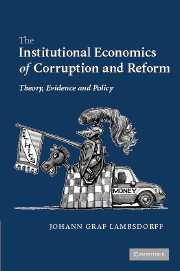Book contents
- Frontmatter
- Contents
- List of boxes
- Acknowledgements
- A roadmap to this book
- 1 Introduction
- 2 Enemies of corruption
- 3 What is bad about bureaucratic corruption? An institutional economic approach
- 4 The dilemma of the kleptocrat: What is bad about political corruption?
- 5 Corruption and transactions costs: The rent-seeking perspective
- 6 Making corrupt deals: contracting in the shadow of the law
- 7 Exporters' ethics and the art of bribery
- 8 How confidence facilitates illegal transactions: An empirical approach
- 9 Corrupt relational contracting
- 10 Concluding thoughts
- Appendix: Technical Details to the Transparency International Corruption Perceptions Index
- References
- Subject index
4 - The dilemma of the kleptocrat: What is bad about political corruption?
Published online by Cambridge University Press: 05 November 2009
- Frontmatter
- Contents
- List of boxes
- Acknowledgements
- A roadmap to this book
- 1 Introduction
- 2 Enemies of corruption
- 3 What is bad about bureaucratic corruption? An institutional economic approach
- 4 The dilemma of the kleptocrat: What is bad about political corruption?
- 5 Corruption and transactions costs: The rent-seeking perspective
- 6 Making corrupt deals: contracting in the shadow of the law
- 7 Exporters' ethics and the art of bribery
- 8 How confidence facilitates illegal transactions: An empirical approach
- 9 Corrupt relational contracting
- 10 Concluding thoughts
- Appendix: Technical Details to the Transparency International Corruption Perceptions Index
- References
- Subject index
Summary
What is bad about grand, political corruption? Similar to the problem of a corrupt bureaucrat, a government's head fails to credibly commit to honesty if being guided by corrupt goals. He thus disqualifies for attracting investors. The advantage from bribery turns against its actor because investors are stripped of guarantees that their property will be honored. Even those politicians who are primarily career-oriented may try to avoid this downside effect and prefer to commit to anticorruption instead.
Corruption has been defined as the misuse of public power for private benefit. But the term “misuse” is open to different interpretations. In Chapter 2, it involved the rules set up by a benevolent principal, which were trespassed by a self-serving agent. While this approach was appropriate for bureaucratic corruption, it appears misguided for political corruption. A self-serving principal, a government that disregards its duty of serving the public, might create an environment where laws do not prohibit its own self-enrichment or that of a ruling class. Corruption can even accompany and underlie the writing and enforcing of rules designed with the intention of furthering the principal's narrow interests.
In case the principal is not benevolent, a definition of corruption as a violation of rules would be misleading. This can be illustrated with a case study from Thailand. It is reported that strict rules prohibit ordinary citizens from taking away anything from the tropical forest in Thailand, even leaves and pebbles.
- Type
- Chapter
- Information
- The Institutional Economics of Corruption and ReformTheory, Evidence and Policy, pp. 81 - 108Publisher: Cambridge University PressPrint publication year: 2007



